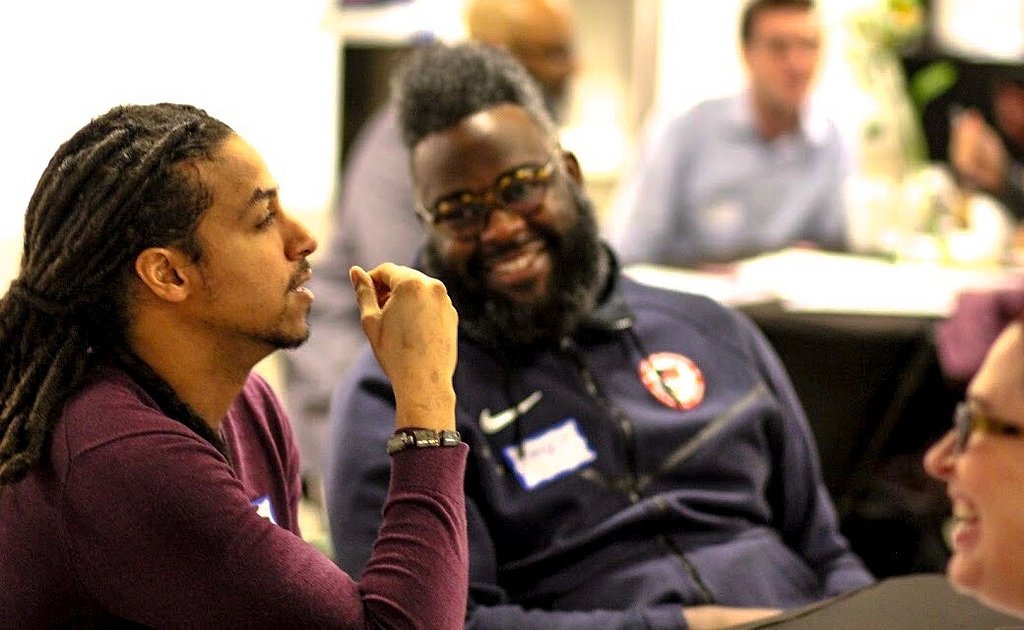A Public Conversation with the Charlotte Observer

Li Horne
Mike McCray, the audience growth producer at the Charlotte Observer, sits in a row with three other people.
He talks about Brooklyn, a demolished Black neighborhood that once stood in Charlotte, North Carolina. He talks about how the Observer’s telling that story today, but how he’s also grappling, after going through the archives, with the paper’s role in shaping a narrative about Brooklyn that enabled the public to accept the neighborhood’s destruction.
It’s honest, vulnerable and powerful.
These are the kinds of conversations that happened at LaCa Projects on Feb. 21 between the Charlotte Observer and the greater Charlotte community.
After months of collaboration between Free Press’ News Voices: North Carolina project and the Observer, where we held small, intimate conversations between community members and local journalists, we decided, with the encouragement of everyone involved, to make these discussions public.
Last Thursday was our first public conversation.
The destruction of a Black community
As attendees arrived, they received tickets for a drink or food item from Basal Coffee, an Afro-Chicano-run coffee shop adjacent to LaCa Projects. Observer Arts & Culture Editor Helen Schwab and I welcomed everyone, giving them context on how we got to this point.
And then we watched a short film about Brooklyn.
From there, participants sat with at least one journalist per table to discuss questions we posed about housing, gentrification and displacement like:
-
Has living in your neighborhood changed — for good or for bad? If so, how?
-
Is there a rule (or law or policy) that has made it harder for you or someone you know to find a place to live?
-
Is there a place other than Charlotte that’s doing a better job of housing its people?
-
What questions do you have about how people are housed in Charlotte?
Weaving through these questions, one participant shared something that brought together a lot of the sentiments people in the room felt:
“The creators of urban renewal are nothing but curators of colonization. When factors such as urban-renewal programs, gentrification and change in infrastructure are in place, we should know that’s the icing on the cake for Blacks and refugees to be pushed out and possibly displaced. This is inhumane and all who are involved in pushing communities out for urban renewal should be recognized and [held] accountable for their warfare. I don’t mind talking about it if we are discussing solutions to take care of the problem. We all know that poor people and Black neighborhoods are being pushed out; what are we going to do to prevent that? Those are stories I’m interested in.”
Participants then engaged in a Q&A with a panel of journalists who worked on the Brooklyn film.
Coverage of Black communities
The conversation during the Q&A explored what journalists see as their role in shifting discussions and actions around housing and displacement. Some of those roles include: holding government officials accountable; unearthing data, trends and statistics around housing; and connecting what’s going on in Charlotte with what’s happening nationally.
When one journalist talked about how they don’t cover Black communities enough, there was pushback from people in the room: “Oh no,” one participant said, “you cover the Black community but you only do it through the lens of crime.”
Many people nodded their heads in agreement. So, we discussed news outlets’ disproportionate emphasis on intercommunal violence in Black communities — and the media’s corresponding tendency to overlook successes, solutions and other positive developments in those same communities.
We hope to continue these conversations throughout the year and beyond to build and strengthen relationships between local journalists in Charlotte and community members. We do this work because we know that it’s much easier to have accountability based in relationship — and because we know that without relationship, there’s little to no hope for trust.
Check out these great photos from our event:




